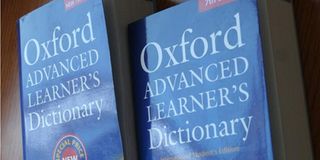Here is the most frustrating habit of our editors

Copies of Oxford Advanced Learner's dictionary. PHOTO | PHOEBE OKALL | FIEL |
What you need to know:
- As far as I am aware, a contest is just the same thing as a competition; so that to “compete in a contest” is like to “see a sight”.
- To compete is to take part in a contest, namely, to try to excel in something.
- To be competent in some field, then, is to possess sufficient knowledge of or skill over it.
Let me never tire of reminding my readers that to use a word or phrase which, semantically, simply repeats something that the utterer has already stated in the same sentence is to tautologise. Tautology is among the most frustrating practices in East Africa’s English-language commerce, evangelism, governance, journalism, classroom teaching, what-not.
Take the headline “Mathematics champions to compete in arithmetic contest in Dubai”. I culled that gemstone from the “Young Nation” pullout of the current edition of the Sunday Nation.
Yet, as far as I am aware, a contest is just the same thing as a competition; so that to “compete in a contest” is like to “see a sight” (as William Shakespeare deliberately causes one of his characters to tautologise).
It is like saying that mathematics whiz kids — of whom Kenya and other East African countries must have a few — will compete in a competition. For to compete is just the same thing as to contest; so that, to use the substantive (noun) forms of those verbs, a competition is just the same thing as a contest.
Thus what the Sunday Nation writer succeeds in saying — what passes the sub-editor’s muster — is that the said young Kenyans will compete in a competition, which is to utter nonsense. For it is like saying that what the ilk of Kenya’s Nyandika Maiyoro and David Rudisha used to do in international meets was to run in a run or to dash in a dash.
EXCEL IN SOMETHING
To compete — I remind the reader — is to take part in a contest, namely, to try to excel in something. It is to strive to become the leading participant in it.
That, then, is exactly why those who evince excellence in or mastery over some field of knowledge or skill are said to be competent in their fields, namely, because they can compete excellently in it.
To be competent in some field, then, is to possess sufficient knowledge of or skill over it. In other words, because I am hopelessly lacking in the gift of oratory — namely, in the ability to talk glibly and persuasively (especially in front of a mass) — I can never compete for your votes with the likes of Uhuru Kenyatta, Musalia Mudavadi, Kalonzo Musyoka, Raila Odinga and William Ruto.
Yet the fact remains salient. It is that all of these are human beings.
Therefore, there must exist some field in which I can best each of them hands down.
To paraphrase another of the incomparable English Bard’s characters, I may be able, if I try, to do everything that all other human beings do all over the world, including in front of a multitude the size of one of those that the New Testament’s Jesus used to address.
However, the opposite must also be true. In my field of competence — namely, English — I readily recognise my own extremely low place in vocabulary vis-à-vis that of, for instance, Duncan Black, Robert Groves, Helen Hucker and Cormac McKeown, the editors of my dictionary Collins.





